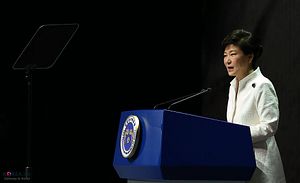South Korea’s ferry tragedy has claimed hundreds of lives, along with the prime minister’s political scalp. Yet President Park Geun-hye is expected to survive the nation’s worst maritime disaster in four decades, along with her reform program, analysts say.
On Sunday, South Korean Prime Minister Chung Hong Won announced his resignation over the government’s botched handling of the April 16 disaster. The sinking of the Sewol ferry has claimed an estimated 302 dead among its 476 passengers and crew, with the captain and two crew members facing life sentences for their actions.
“I offer my deepest condolences to the families of the victims,” Chung said during a televised address. “I apologize to the nation for the government’s failure to prevent the ferry disaster and to handle the accident properly.”
Chung’s resignation was accepted by Park, who has seen her approval rating sink to 57 percent on April 25, down from 71 percent just a week earlier. Worryingly for the nation’s first female president, metropolitan, municipal and provincial elections are scheduled for June, although Park’s ruling New Frontier party still had a large 53 percent to 27 percent lead over its main opposition in the latest survey.
Newspaper editorials have blasted the president over the disaster, with headlines such as “Does President Park finally understand the rage of people who say ‘we can’t trust bureaucrats?’” from the major Dong-a Ilbo newspaper.
Myongji University Prof. Shin Yul told Bloomberg News that Chung’s resignation would not blunt public anger, however.
“The resignation may slightly assuage public grief, so Chung was right to express his intention this week,” Shin said. “It may tip the scales a bit, but in terms of the elections, this incident has been unfavorable to both parties because voters are angry with all public figures.”
Political Stability
While Park has described the actions of the ferry’s crew as akin to “murder,” economists expect her reform plans to survive relatively unscathed.
In a research note released Sunday, ANZ senior economist Raymond Yeung said: “While our thoughts are with the victims and their families, we do not think the disaster will dampen the political stability of President Park Geun-hye administration. This [incident] and the recent scandal over wrongful practice of National Intelligence Service have done little to dent Park’s popularity.
“She finished the first full year of her single five-year term with more than 60 percent of people surveyed in various polls giving her a favorable performance rating.”
Yeung said the tragedy would be unlikely to affect the nation’s monetary policy, adding the bank remained relatively bullish about the growth outlook for Asia’s fourth-biggest economy.
“We are still optimistic about the growth outlook of the economy and believe it will continue to expand at more or less the same pace as [the first quarter] in subsequent quarters in 2014. But the [gross domestic product] will unlikely meet the [Bank of Korea] forecast of 4 percent with the lingering concern of the underperforming household consumption. We maintain our forecast of 3.7 percent,” he said.
South Korea’s economy expanded by 3.9 percent on an annualized basis in the fourth quarter, above market expectations for a 3.8 percent rise, “largely due to a technical adjustment” for intellectual property. While exports rose by 1.7 percent, imports dropped 0.5 percent and private consumption posted slower growth than the previous quarter.
The nation’s central bank recently cut its inflation forecast to 2.1 percent from 2.3 percent for 2014, with a higher growth forecast, thereby effectively ruling out further interest rate cuts this year, according to ANZ.
In February, Park marked her first year in office by outlining a “474 Vision” of 4 percent economic growth, 70 percent employment and $40,000 per capita income, with a three-year “economic innovation plan” to spur growth particularly in the services sector.
The president’s plan to reduce the nation’s dependence on exports follows data from the International Monetary Fund that Asia’s export-driven growth model is sputtering. Combined exports from China, Japan, South Korea and Taiwan dropped by 2 percent in the first three months of 2014 from the same period a year ago.
“That model that Asia had of relying on the trade channel—that’s gone,” said Markus Rodlauer, deputy director for Asia and the Pacific at the International Monetary Fund.
Despite the gloomy prognosis, the BOK announced Tuesday a rise in the nation’s current account surplus to $7.35 billion in March from $4.5 billion in February, with overseas shipments climbing by 5.5 percent.
In its latest regional outlook, the International Monetary Fund has forecast GDP growth for the Asia-Pacific region of 5.4 percent this year and 5.5 percent in 2015, helped by stronger external demand despite an expected tightening of global liquidity. Nevertheless, the IMF cut its 2015 forecast for South Korea by 0.2 percentage point to 3.8 percent, below the government’s target, while warning of increased competition from Japan.
Park recently signed a free trade deal with Australia and is seeking a pact with China, while guarding against further provocations by North Korea, an issue discussed during U.S. President Barack Obama’s recent visit.
While Park’s government faces a continuing test over the ferry disaster, successfully steering her economic program could pose an even greater challenge for the reform-minded leader.

































